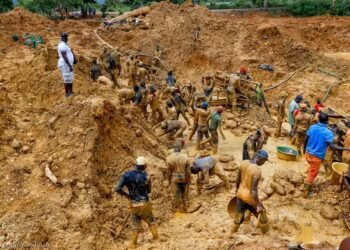The Democratic Republic of Congo’s army has denied the presence of fighters from Russia’s mercenary Wagner Group in the country, in response to claims by a rebel group.
The army has been struggling to contain the M23 rebel group that has in recent months captured swathes of territory in the eastern part of the country. Reports have suggested the presence of Russian mercenaries in North Kivu province on the government’s invitation to help deal with the rebel group.
“It is true, Wagner Group is here. We have evidence that we will show in due time,” M23 spokesperson Willy Ngoma stated. He indicated that they had fought a joint team of the Congolese army and the mercenaries last week in Tongo and Nyamilima fronts in the Rutshuru area.
But the army spokesperson Major General Sylvain Ekenge has denied the claims. “The Wagner group is not operating in DR Congo,” he denied.
Russian mercenaries have a presence in DR Congo’s northern neighbour, Central African Republic, where in 2021 they played a role in fighting rebels.
Last year in October, Congolese President Félix Tshisekedi told a meeting in London that he would not bring in Russian mercenaries to deal with the rebel activity in his country. “I know it’s fashionable now… [but] no, we don’t need to use mercenaries,” he was quoted as saying.
Hundreds of Thousands Displaced
The unrest in eastern DR Congo has displaced hundreds of thousands from their homes. The United Nations Organization Stabilization Mission in the Democratic Republic of the Congo, also known as MONUSCO has launched a new operation to protect civilians in North Kivu province, the epicenter of the ongoing conflict in eastern DR Congo.
The move came shortly after fighting resumed on Sunday, 8th January 2023 between the Armed Forces of the Democratic Republic of Congo (FARDC) and the rebel group M23, 70 kilometers north of Goma, the capital of North Kivu.
In a statement posted on Twitter, MONUSCO said that its “Force Intervention Brigade launched Operation LINDA NJIA (Protect the Road) to maximize the protection of civilians in North Kivu.” It added that “MONUSCO and the FARDC (Congolese army) are intensifying field patrols to counter the movements of armed groups.”
According to the United Nations (UN), the protection of civilians in eastern DR Congo remains a major challenge.
The armed conflict between the M23 rebels and the Congolese army has created massive displacement in the region, with thousands of people fleeing their homes.
“MONUSCO supports the steps aimed at implementing the decisions of the Luanda mini summit,” MONUSCO spokesperson Khady Lo Ndey said. The summit, which was held in Luanda last November between Congolese and Rwandan authorities, ended with an agreement for an “immediate cease-fire.” The parties also agreed to demand “the immediate withdrawal of the M23 rebels from the occupied areas.
Tensions between DR Congo and Rwanda over M23 also flare sporadically, with the Congolese army consistently accusing neighboring Rwanda of arming the rebels.
Ndey added that the “strict implementation of the decisions of [the] summit will minimize the armed clashes in North Kivu and thus, contribute to the protection of civilians and the return of displaced persons to their places of origin.”
However, the most recent withdrawal announced by the M23 rebels has not gone to plan, with locals saying the handover of the strategic town of Kibumba has not been “effective.”
Under heavy international pressure, M23 announced its intention to withdraw from the swaths of territory it occupies after meeting representatives of the Congolese armed forces, the East African Regional Force, MONUSCO, and the East African Community (EAC).



















